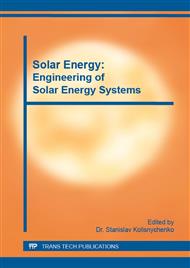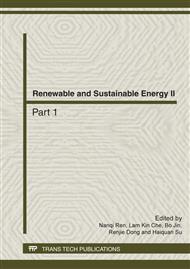p.208
p.214
p.219
p.225
p.230
p.234
p.238
p.242
p.246
A Simulation Model for Predicting the Performance of Solar Domestic Hot Water System
Abstract:
The article deals with the modeling and simulation aspects of the performance improvement of a solar domestic hot water system. A mathematical model of this system is carried out to predict its operating performance under specified weather conditions of Jeju Island, Korea. The optimum mass flow rate through collector based on the relationship between the useful heat gain of solar collector and the electricity consumption of solar pump is investigated. Besides, the effect of various parameters such as solar collector area, initial water temperature and volume of storage tank is analyzed. The result of the simulation shows that the optimum mass flow rate was determined at kg/s with the new coefficient . At this value, the amount of useful heat gain slightly decreased about 84.3 (Wh) corresponds to 0.16% but the amount of electricity consumption strongly decreased about 227.8 (Wh) corresponds to 48.8% compares with kg/s ( ) was proposed by . Furthermore, the system performance is affected strongly by the change of collector area, initial water temperature and volume of storage tank.
Info:
Periodical:
Pages:
230-233
Citation:
Online since:
May 2012
Authors:
Price:
Сopyright:
© 2012 Trans Tech Publications Ltd. All Rights Reserved
Share:
Citation:



